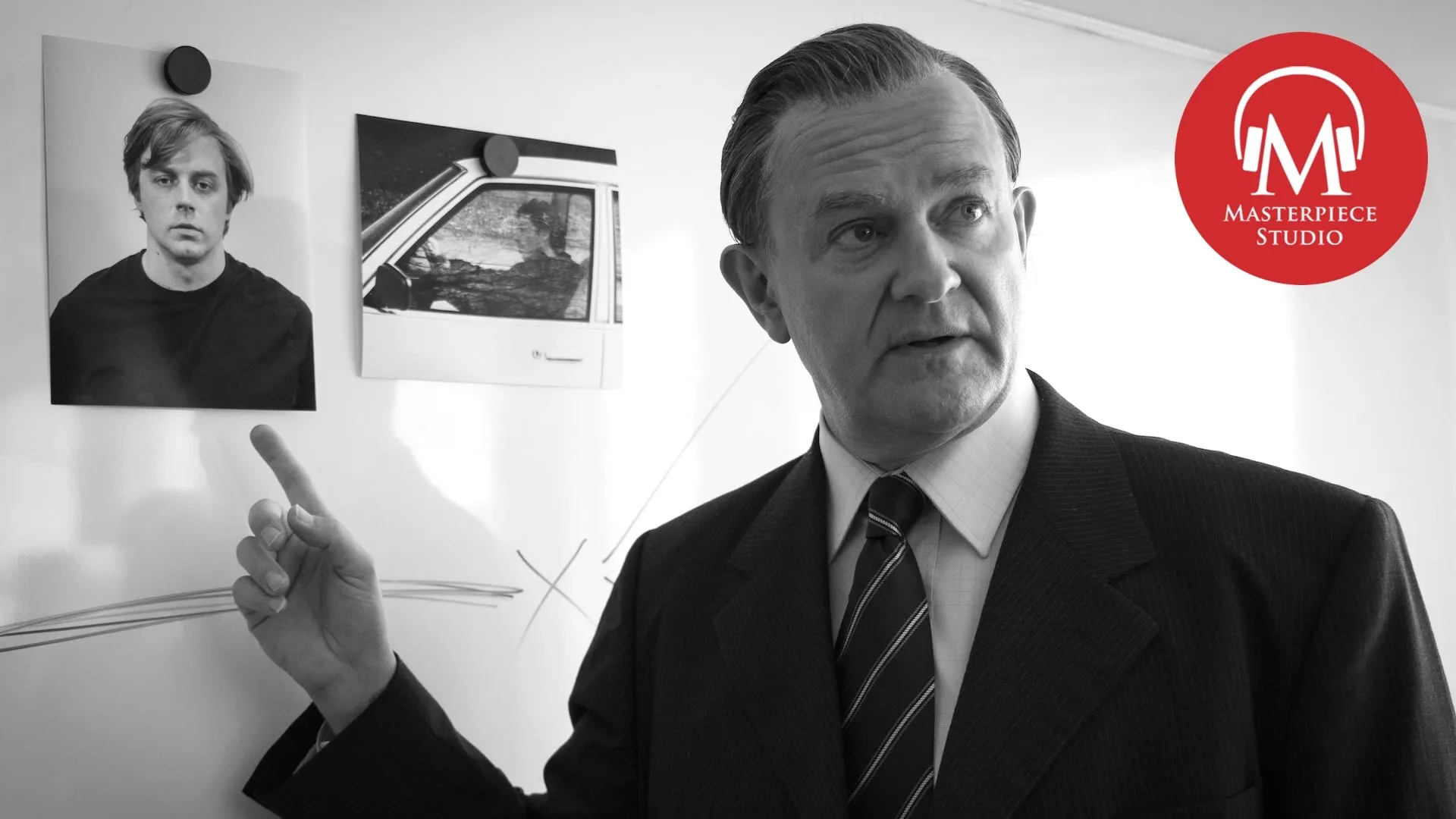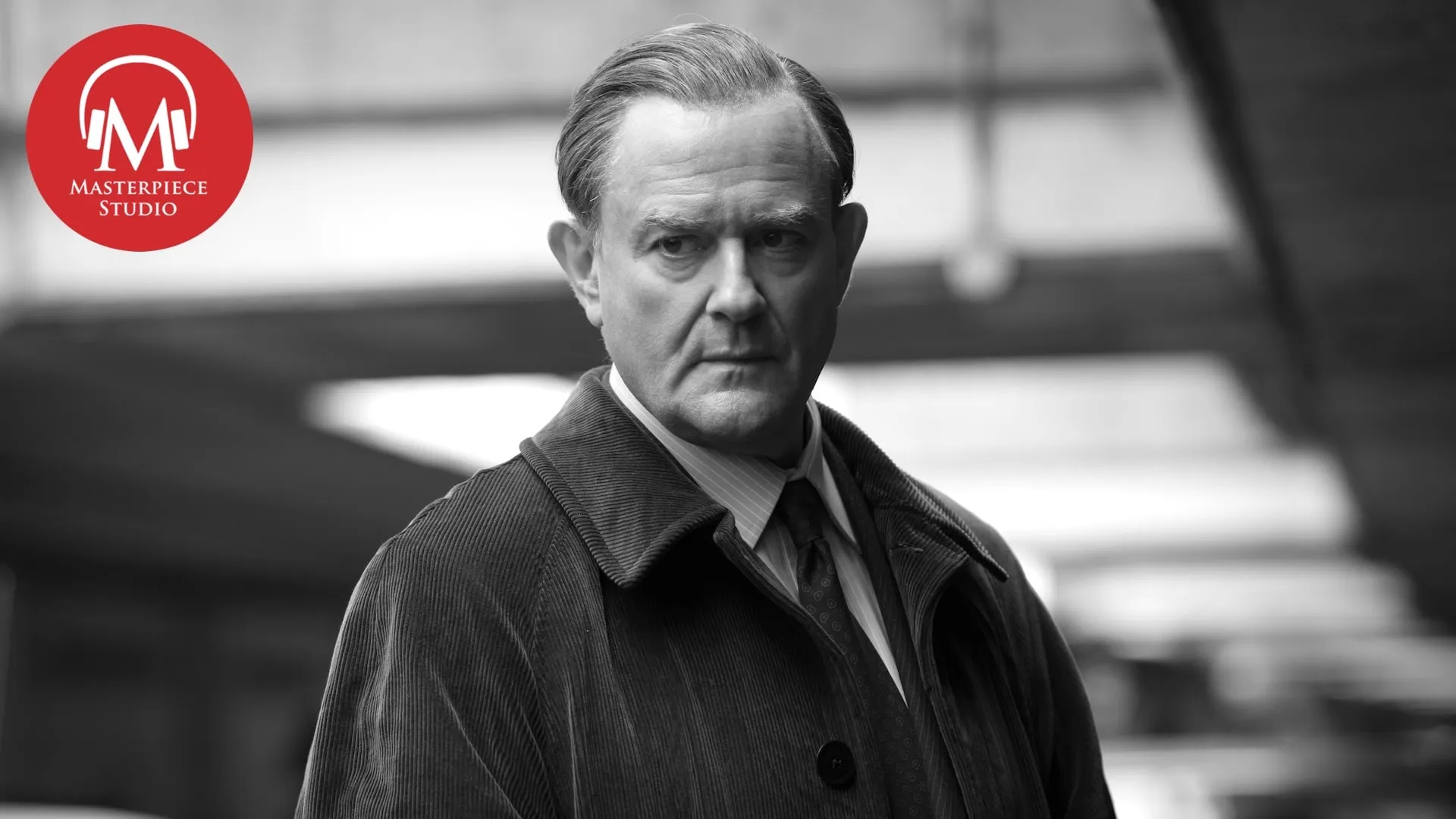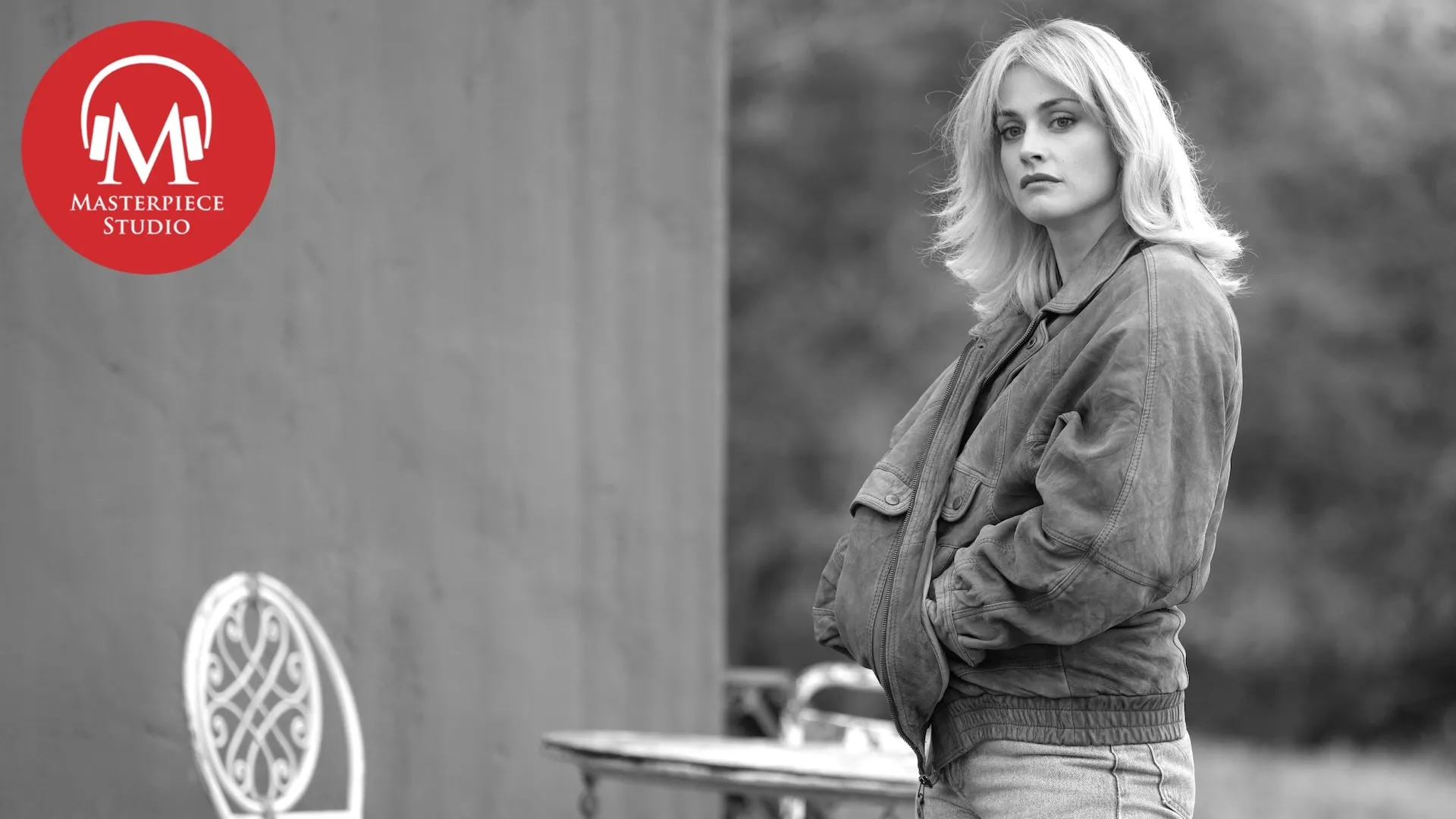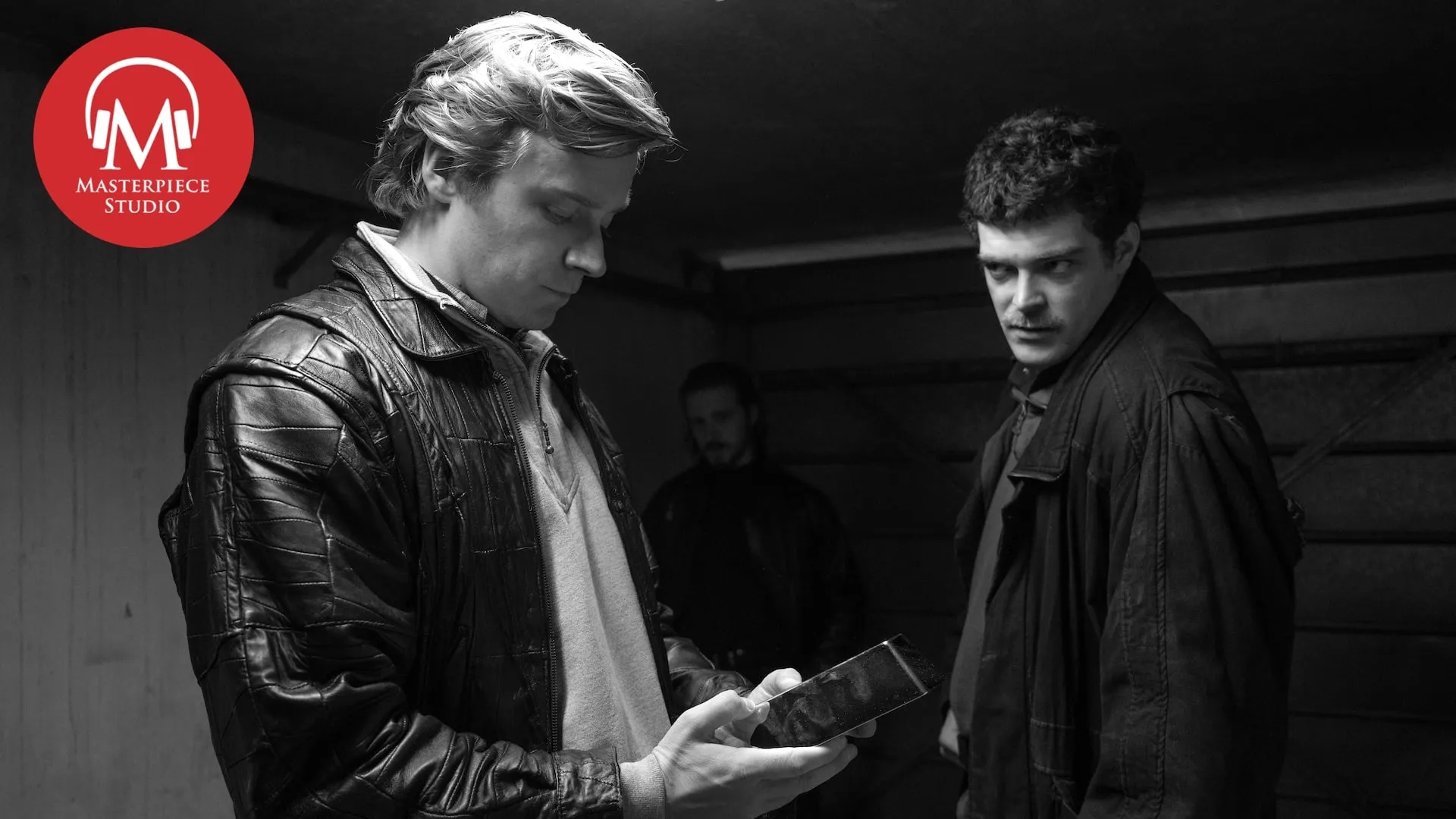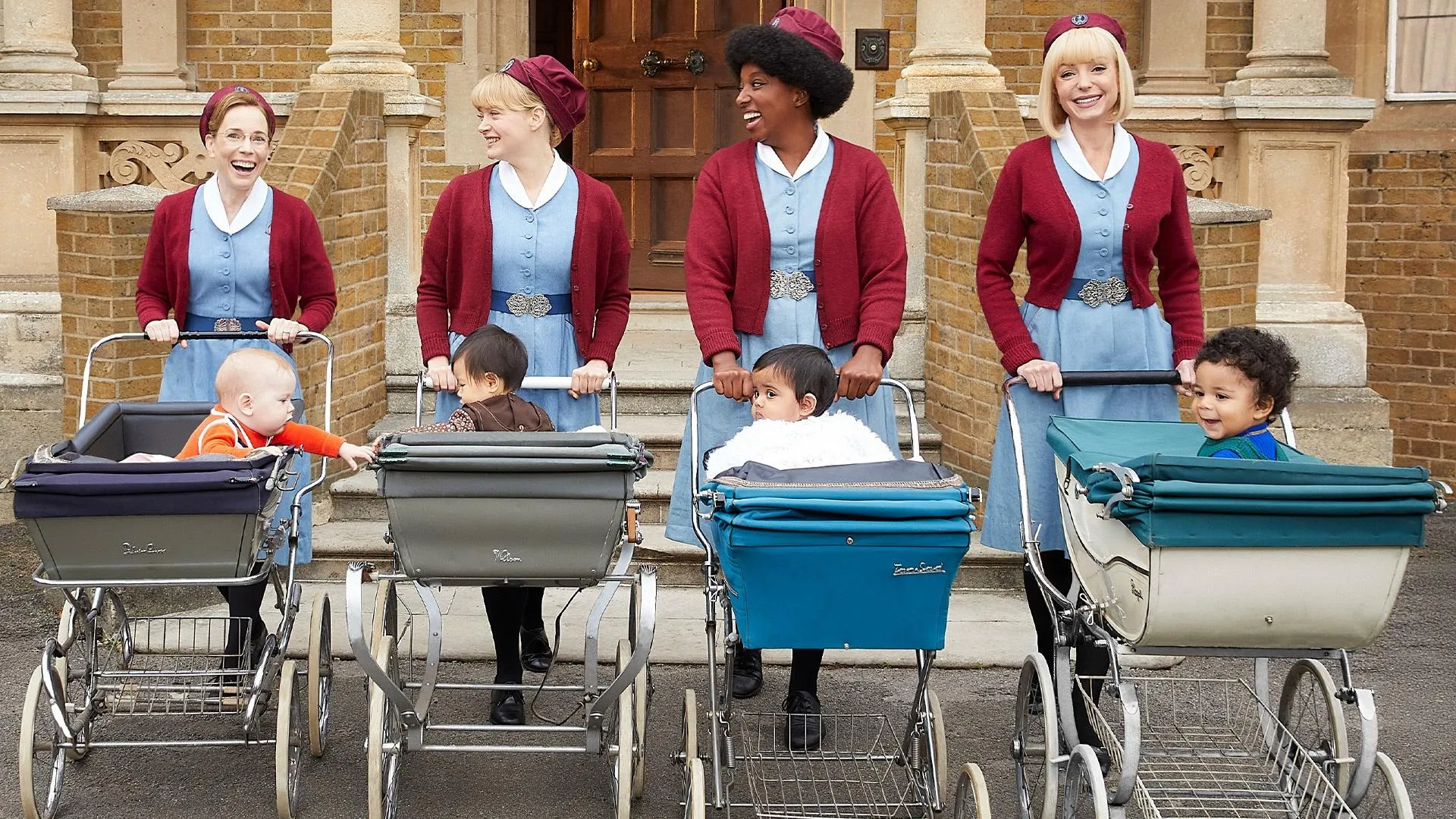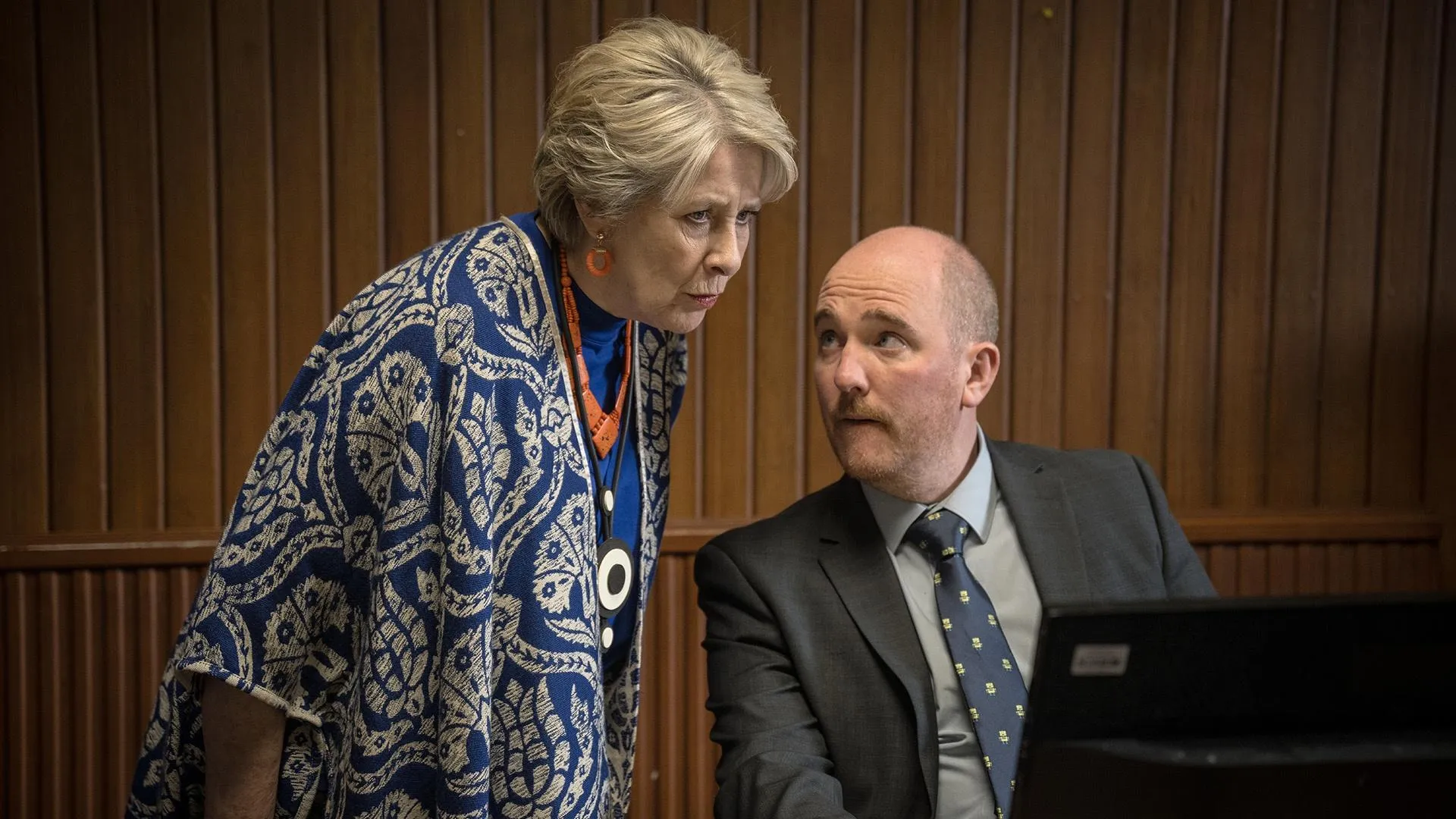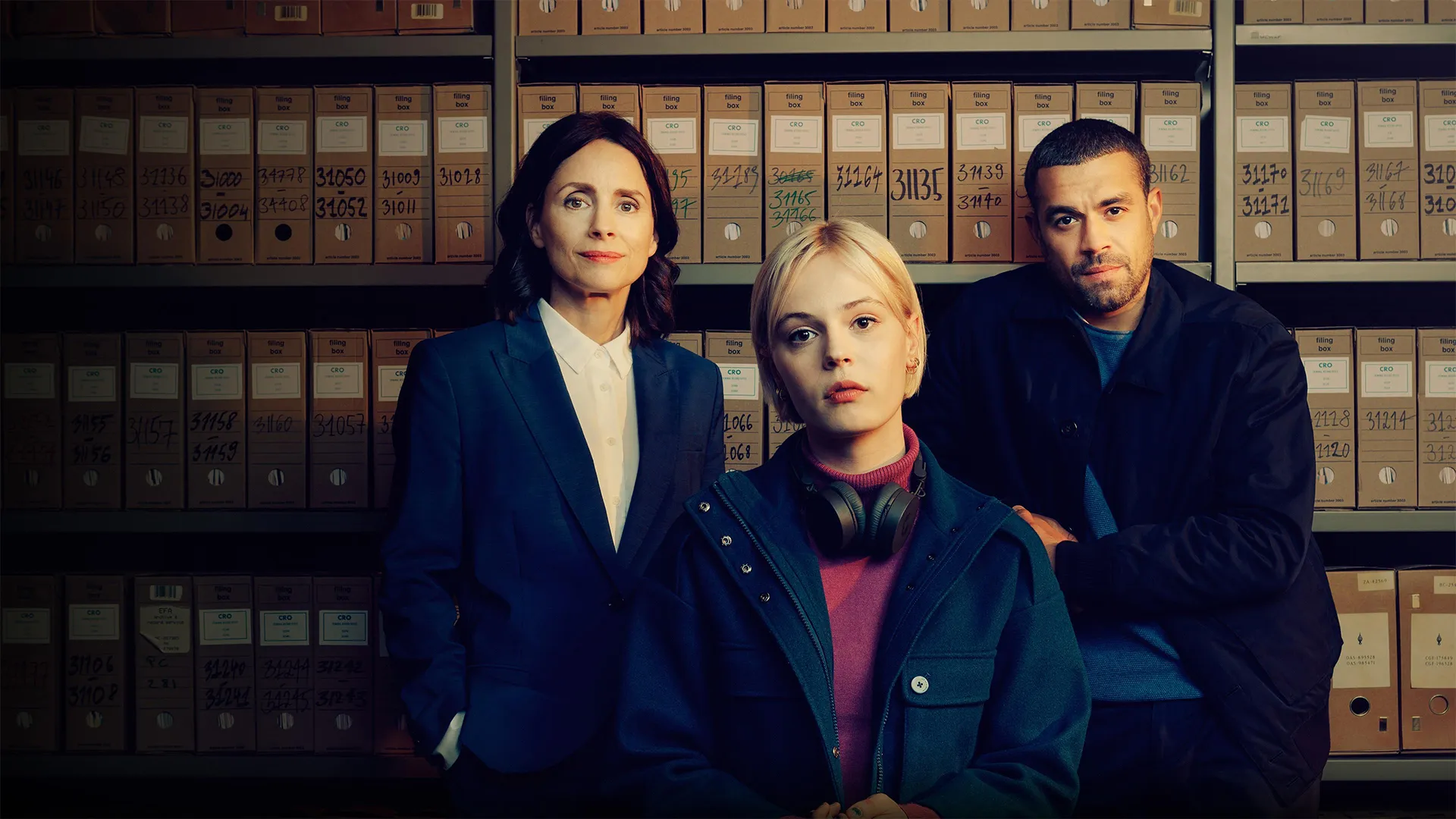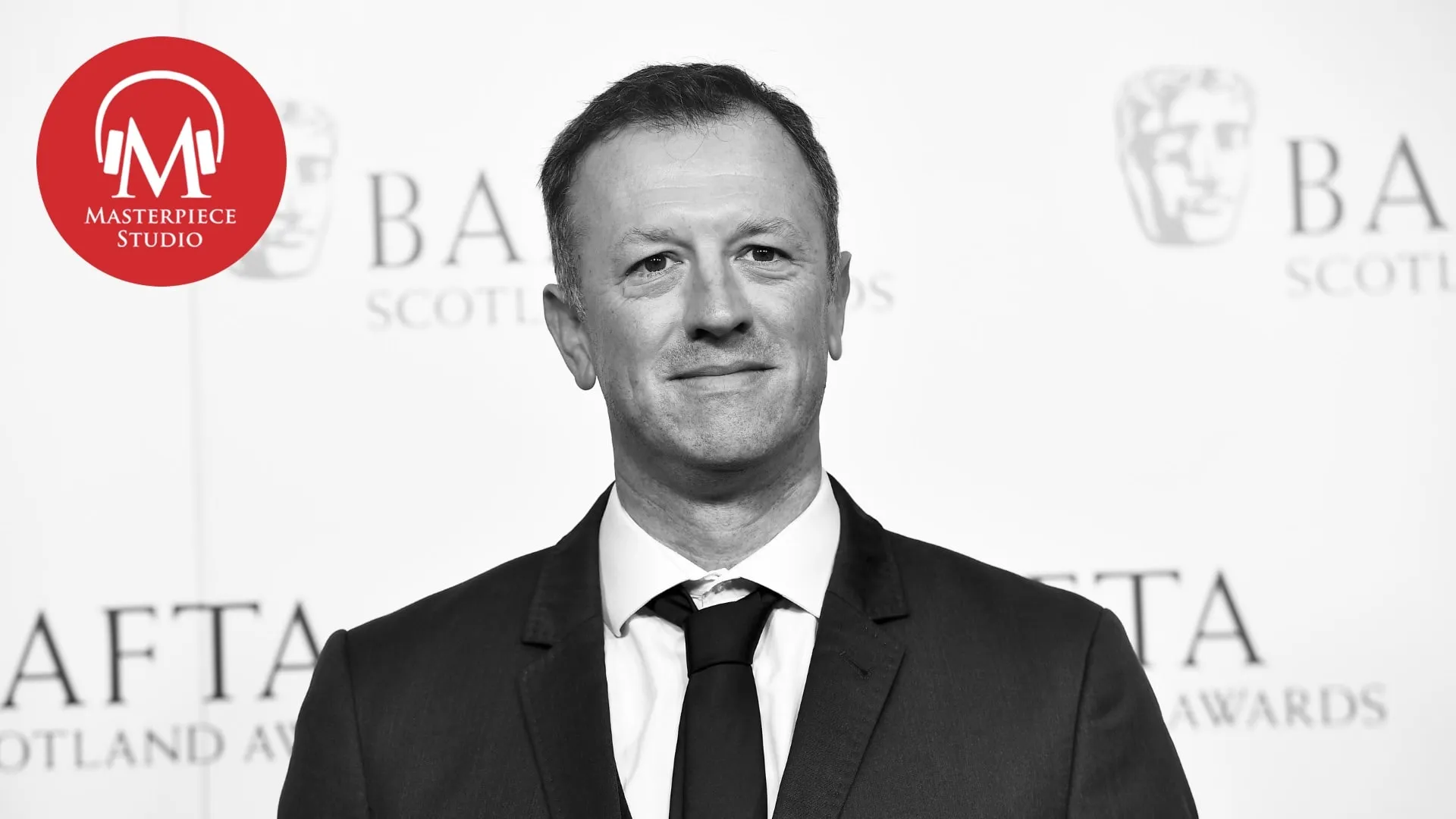
Neil Forsyth, The Gold Episode 1 Season 1| MASTERPIECE Studio
Released October 6, 2025 27:00
WARNING: This episode contains spoilers for Episode 1 of The Gold. Writer and executive producer Neil Forsyth had his work cut out for him when adapting the larger-than-life true story of the Brink’s-Mat robbery. Too big for a single film adaptation, Neil decided this vast web of characters, plot, and conspiracy would be best told as a drama series. In this conversation, Neil talks about Episode One of The Gold and the decisions he made weaving together countless hours of research with compelling character arcs and dialogue to create this pulse pounding drama.
This script has been lightly edited for clarity.
I’m Jace Lacob and you’re listening to MASTERPIECE Studio.
For what becomes one of the largest heists in British history, this story starts out with far more modest aims. The six armed men who broke into the Brink’s-Mat warehouse on that late November morning in 1983 did have intentions of robbery, but only for a mere £1 million worth of foreign currency. However, the robbers were never actually able to make it into the vault as one of the security guards, paralyzed by the sheer terror of multiple loaded weapons aimed at him, couldn’t recall the keypad code.
CLIP
Ralph: I can’t remember.
Freddie: Come on Ralphie.
Ralph: I can’t remember. We only use it for the drills. I can’t remember.
Micky: We know every note in there. We know the currency, and we know you are trained to delay us.
Freddie: Delay you? I'd carry the money to your bloody van. I just can't remember.
This hiccup in the operation leads the armed robbers to notice the £26 million worth of solid gold bullion that was sitting outside the vault, too large to actually fit inside Unit 7’s far more secure vault. A theft this big and this unexpected brings with it unwanted attention from the Metropolitan police force. Enter the decorated and by-the-book DCI Brian Boyce, who heads up a hastily convened task force to recover the gold, against his better judgement.
CLIP
Brian Boyce: I did 20 years in London, from the beat to Criminal Intelligence. I've nicked every villain in this city once and the good ones twice.
Gordon Stewart: That's why you're here.
Brian Boyce: I don't want to be wondering which of my team are Masons, which are on the take, and which are both, which means I don't want Flying Squad, and is why they won't want me.
Gordon Stewart: They don't.
Cath: But they don't want Brink's-Mat either.
Today, we’re joined by The Gold writer and executive producer Neil Forsyth to talk in detail about Episode One, and how he adapted this larger-than-life true story for the screen.
Jace Lacob: And this week we are joined by The Gold writer and executive producer Neil Forsyth. Welcome.
Neil Forsyth: Thanks. Thanks for having me.
Jace Lacob: You were working on Guilt when you started The Gold, which is a very different crime story that ripples across continents. When did you first become aware of Brink’s-Mat and what attracted you to adapting this as a drama?
Neil Forsyth: Well, I had known about the robbery the way most people in Britain knew about the robbery. I recognized the name of the Brink’s-Mat heist. I sort of could have had a rough guess at when it was and what was stolen, and that was probably about it. And then I was approached by people who were looking to develop it as a film. I did quite a lot of initial research and just thought, well, it's clearly a much bigger story than a film and a more interesting story because I think you can see the film version of this, the kind of straight up heist film.
I wasn't particularly interested in that, but I was very interested in everything that happened after the robbery. And I thought that it was so complicated and so sprawling and interesting that it could really be told over a big canvas. And that's quite rare, to be honest, for a true story. For a true story to have that layer of nuance and complexity is very unusual.
Jace Lacob: Episode One of The Gold balances the tension of the heist with glimpses of its human impact, juggling the fallout from the robbery with the police's mission to find the villains. How did the morning of the heist provide the ideal cold open for Episode One?
Neil Forsyth: I just wanted to hit the ground running. And the more I thought about it, the more I thought, I wonder if I can just tell the story of the robbery within the cold open. And it was quite an exciting and daunting challenge, but I think it was the right decision because just such an explosive, exciting, seductive way into the story, as the writer, that pace is incredibly attractive. I also just thought narratively it was the right decision. I always felt with Brink’s-Mat that the most interesting story happens as they drive away with the gold. Because that's where the real challenge became, and that's where the story becomes so unique and unexpected. So to get to that point as quickly as possible, I thought was important.
Jace Lacob: What I love about the way that the heist is portrayed is that it does feel almost like a documentary recreation. We feel the level of detail that you bring to the writing through that vast amount of research that you did. And the heist as presented here even tones down some of the violence as it occurs in reality. How did you decide what to play up and what to leave out from the heist?
Neil Forsyth: The thing about a heist is there's usually a bit of standing around as people try to break through locks or get combinations right, or make sure they've got everyone together. So just dramatically, you're not going to show a lot of that. And it's the same challenge with any dramatization or even if you're fictionalizing a scene is, keep the things you need to keep and lose everything else. And that was kind of the key to it. And make sure you're following the characters you need to follow.
The big thing I needed to do is to make sure that the viewer didn't guess which one of the security guards was the corrupted figure. So I had to work a little bit on that, and I think we managed to do that to make sure that's a kind of suitable rug pull later on in the episode. And I think it was to show the hierarchy of the robbers, to show the energy of it, to show their confidence as they went in, the surprise when they saw what they found, but also what that gold offered them. Just that little peek of where that could take them.
Jace Lacob: Class and ambition are woven throughout The Gold. Edwyn Cooper, Kenneth Noye, John Palmer all transcend their humble origins to become players in this new world. How did you look to weave those themes of class and ambition into the first episode?
Neil Forsyth: Well, I think it's just trying to install these things without being heavy handed. It could be as simple as choice of vehicle or costume or location or a throwaway comment. Or the performance, it could be how they're delivering the scenes, what excites them within a scene. There's many ways to plant someone's background and outlook and their dreams and ambition, rather than necessarily overtly putting it into dialogue, of course. But I think that's true, I think ambition, I think everyone in The Gold wants to break into a world that won't necessarily have them. And I think they all want to break into worlds where they think their life will be infinitely better. And what we show is a lot of them achieving that and then finding how the reality is very different.
1983 Britain, the one institution that was said to be changing that probably wasn't really changing at all is the British class system. But as all the other institutions were under attack or facing the ground shifting between their feet from deregulation or public distrust and everything else, I think what The Gold really shows is the fallacy of the idea that Britain could be a classless society. I think it showed people attempting to live out that fallacy and coming up short.
Jace Lacob: And I love the introduction of Jack Lowden’s Kenneth Noye, which underscores that notion. He's poaching rabbits from his neighbour's grounds. He doesn't need to anymore.
CLIP
Brenda: Don't you be cutting them in the kitchen, Ken. I don't want no blood on my marble.
Kenneth: What, it keeps it honest.
Brenda: Oh. You know you don't have to go poaching no more, don't you?
Kenneth: Yeah, but that's what makes it fun. He's a duke that owns them woods. That is how England works, love. That lot have it, and us lot nick it.
Jace Lacob: Does that line comprise the very heart of The Gold story, the story of English class warfare itself?
Neil Forsyth: Absolutely. That character and all the characters, we lean into that. And I think it's such a, this is probably a little bit simplistic, but it feels like a fairly unique thing, that absolute intransigence of the English class system and the British class system, I should clarify. But the people trying to move within those classes and discovering that it's not about having a bigger house, for example. It's about so much more than that and so much that's entrenched both with the society around them and within them, although they often try to deny it. Yes, I think class, the Brink's-Mat story is riddled with the British class system. And I think that's something that we very much embraced.
Jace Lacob: From the off we're presented with bent coppers using the services of gentleman solicitor Edwyn Cooper to rehabilitate them. They must appear to be above suspicion. What is the role of virtue here, and how is it tainted by Cooper's own sort of false purity?
Neil Forsyth: I think anyone that sets themselves up as a great symbolic representation of virtue are obviously doing it for likely nefarious reasons. And certainly that was what that character was doing, he was representing corrupted policemen. Whereas he was a hopelessly corrupted figure in his own right. And I think the theme of corruption is obviously something that we very much lean into in the show, but it's all all through character, and I think that's the key thing.
The thing for me, I always found it fascinating with The Gold, of the people who were involved, and there were many of them who woke up in the morning thinking the last thing that would ever happen in their lives is to be part of a vast criminal conspiracy. And by the time they went to bed, they were part of a vast criminal conspiracy, and how did that happen? And I think that that's really interesting. And while there's a kind of uniformity to the greed of these characters, there's a uniqueness to each of their personal motivations to embrace it, or to give in to it. And it was investigating that that I thought was really interesting. And that's how you make your characters distinct, of course within an ensemble. But equally, there was a truth to all those motivations that I thought was really interesting.
Jace Lacob: Hugh Bonneville's Brian Boyce is based on the real life DCS behind the Brink's-Mat investigation, though he didn't come into the inquiry in reality for its first year. What sort of conversations did you have with the real life Brian Boyce about his involvement, and what did you make of him?
Neil Forsyth: Well, I had revelatory conversations with him. It was absolutely vital getting to Brian Boyce, and it wasn't easy. He's a man who, for fairly obvious reasons, has made himself hard to find. And he was involved in not just Brink's-Mat, but a lot of very controversial investigations and was responsible for the imprisonment of some very serious criminals. So I tracked him down one way or another. I visited him in a sort of rural English village. And yeah, it took a while to sort of, I guess, win his trust to a degree. There was a lot of wariness. By the end, I like to think we were friends. And we had some fun lunches. And there's not too many opinions that I would worry about when the show came out, but that was certainly one of them.
Jace Lacob: I love Hugh's performance in the interrogation scene with Robert Wright. It's clear that Boyce knows the London underworld inside and out, and he uses that knowledge to get Wright to identify the ringleader without even naming him.
CLIP
Robert: I ain't telling you nothing.
Boyce: Oh, no, you don't have to. Just you sit there while I think. Armed robbery…six men, bit of planning but not enough. I want to say Jimmy Wood, but that's the North London in me, and he wouldn't recruit south of the river. There's the Knight brothers, but they always work alone. There's Frankie Maple, but he's hiding out in Morocco after the Bank of America job. There's Billy Green, but last I heard, he'd seen the light and was running a tea shop in Whitstable. Can you imagine, Robert? This country used to win wars. Now Billy Green's running a tea shop in Whitstable. But, look, let's not get fancy. It's Rotherhithe. It's armed robbery. Why look past Micky McAvoy? Yeah, it's McAvoy.
Robert: I didn't say anything.
Boyce: We'll keep you here for as long as you are useful. Then it's the Scrubs, where their mates are. So you'd best just stay useful.
Robert: I want a lawyer.
Jace Lacob: How did you look to use that scene to subvert the audience's expectations of a tried and true police interrogation scene?
Neil Forsyth: I like the idea of the detective not needing the criminal to say anything, I thought that was really interesting. I'm not aware of having seen it before. Maybe I've subconsciously nicked it. It will definitely have been done. There’s nothing new under the sun. But I thought it'd be an interesting way to write it. And like you say, it also let us see the real hinterland of Boyce's intrinsic knowledge of London criminality. But then you're relying on the actors and you're relying on the director. And the actors performed fantastically and it's, yeah, it's a really memorable scene for me.
Jace Lacob: I love it. Brian Boyce, DI Tony Brightwell, DI Nicki Jennings anchor the investigative thread within The Gold. How did you look to use their first episode introductions to balance empathy, urgency, and institutional tension?
Neil Forsyth: What's interesting with them, I think, is ambition. I think you want your characters to have ambition. And I think running that across the criminals and the police was very important. Generationally, Jennings and Brightwell character are close to Noye and Palmer and many of the others. And I think that was important as well, that these are all people of roughly the same age, of roughly the same background living in London in 1983. And there's a sort of infectious ambition there that I think is really interesting.
So that was important. And then I think it was showing their awareness that they were working for an organization that was going to have to change. And I think they saw themselves at some level perhaps, as being agents of that change. But equally they were people that wanted excitement, and I think that's really important. The police do very important work, but they're also human beings. And I think when you have people in their late 20s, early 30s, they're looking for, like in any other job, they want promotion and excitement and access to the best stuff. And the Brink's-Mat investigation was the best stuff. So I thought that was important, to reflect that honestly.
Jace Lacob: Brightwell and Jennings’ partnership is one of the things I love best about The Gold. There's a rough and tumble jocularity there, something we don't often see with platonic opposite sex friendships or partnerships. How did you approach writing Emun Elliott and Charlotte Spencer's scenes together?
Neil Forsyth: You don't want to feel you're going down the generic, sort of wisecracking pair of detectives, but you do want to try and feel that relationship has a bit of a hinterland and has a bit of nuance to it and chemistry, platonic chemistry, and also as a route to get humor into the show. It's so important for me to have humor in my dramas, and I think you've got to identify the characters and relationships where you can get that in, in a natural way that feels like a natural home for these touches. And that was definitely one of them. But again, you're relying on performances and they're great actors and they work very well together, thankfully.
Jace Lacob: Boyce talks about nicking Jennings' father, saying criminals will look for weak links and Jennings’ response,
CLIP
Jennings: When you nicked him, did he talk? He's not a weak link. Neither am I.
Jace Lacob: How does Jennings’ South London background, her familiarity with these people inform the way she approaches the criminals she's chasing?
Neil Forsyth: I think she understands their venal lack of morality, and I think that's very important to recognise that, because then, like me as a writer, you have to understand your characters to be able to predict what they'll do next. And I think that she understood that world enough to predict, when necessary on a few key occasions, what they're going to do next. It also gave her a steel and a fearlessness that was very important that when criminal figures sought to intimidate her, they were unsuccessful, and that was very important as well. Because we show most of our key police characters be either intimidated or attempts to corrupt them. And it was important to show the reasons that they were able to reject those advances.
MIDROLL
Jace Lacob: We’re back with The Gold creator Neil Forsyth. Tom Cullen’s John Palmer would seem to have it all. A beautiful house, a beautiful family with his daughters, his horseback riding wife, Marnie. Why does he risk it all to smelt the Brink's-Mat gold? What drives his character at this point in his life, even before he transforms in later life into the notorious Goldfinger?
Neil Forsyth: It is an unquenchable ambition and greed. I mean, what's interesting with a lot of these criminals that got involved with Brink's-Mat, is that they were already wealthy. They were already wealthy individuals, some through criminality, some through legitimate businesses, and often a mixture of the two. But you know, why does a millionaire still go to work in the morning? Because they want to earn another million and another million and so on. And that's the same for these criminal figures. That they they were offered access to the big job, the one that they'd always dreamt of, the one that would kind of change everything and put them into a stratospheric rise through the levels of British society and criminality and the notoriety it would bring, which I think was attractive to a lot of them. And we saw the consequences of that. But also, these are Thatcherite characters, Noye and Palmer, without doubt, and they are products not only of their backstory, but products of their society around them in 1983.
Jace Lacob: My favorite moment in Episode One, I think, is Kenny's “I Can Be a King” speech on the telephone with Micky McAvoy. And Lowden is sensational here. He says,
CLIP
Kenneth: I haven't taken it, Micky. It wasn't mine to take. But gold like that…you can't control it. No one can. And if you can't handle it…then it will find its way to someone who can. And I can handle it, Micky. I'm ready. I can be a king.
Jace Lacob: How difficult a speech was this to write, to epitomize Kenny's drive and ambition so precisely and so deftly?
Neil Forsyth: I think you go into writing something like that with what you want to say, a couple of the key lines in your head, and then you just trying to get into something that walks the very delicate line by being the elegant dialogue you're hoping to write while feeling like it could still come from that character, and you're not placing yourself too heavily in there as the writer. And whether or not that was achieved, people can debate, but I'm very happy with that ending of the episode. And I think that it does a lot of things. It encapsulates the character's outlook, it encapsulates in many ways the show's outlook, and it hints at a lot of what's to come, while also summarizing what we've just seen. So you're trying to do lots of things with a moment like that, particularly at the end of the episode.
Again, very nicely shot and nicely acted, but I think I kind of got away with it. As always with speeches in my scripts, I've got a very good script editor, Rhiannon, who's also my wife. And that's purely a coincidence. You don't have to marry them. But you know, what will usually happen with my scripts is I'll write a far more verbose version of a speech like that, and then she'll kind of pressure me into whittling it down. So I think that's probably what happened. And then you take it down to what you think is the real nub of what you're trying to do. So yeah, I think it's a powerful, powerful end point for an opening episode. And obviously a very pragmatic basis, you want people to keep watching. And I think that hopefully does that along with the twist that it comes paired with.
Jace Lacob: I've seen that scene probably one hundred times now and it takes my breath away every single time. It's the writing, it's also the way Lowden turns the phone to seethe those final words, “I can be a king.” And it's such a small detail, but it speaks volumes. What does this moment mean for Kenny crowning himself, as he does with his words? Is it a declaration?
Neil Forsyth: Oh, well, yes. It's Kenneth Noye planting what he saw as his moment of victory. It's seizing the opportunity. And I think that, again, is a big part of The Gold, it's people seeing opportunity, not thinking too much before they seize it, and then dealing with the consequences after.
And it's the shift in power. I mean, what that scene really is, is the shift in power from the original robbers to this new level of criminals who are going to take on the gold, repurpose it, and sell it back into the marketplace. What they then found is that they would also get usurped, because that's what's very interesting I think with The Gold is that everyone was out of their depth. So the original robbers that knew how to put together a traditional heist did so with great success, but then didn't know necessarily how to get all that gold and turn that gold into money. There was now a new collection of criminals, which were represented largely in our show by Kenneth Noye and John Palmer, who did know how to turn that gold into money, and did so very successfully, but then didn't know how to launder the money. So then we had the white collar criminals that knew how to launder that money did so again very successfully. But they didn't know how to deal with these criminals when things became dangerous.
And then with the police, they were at their depth originally. They didn't know how to investigate money laundering. They didn't know about these connections between organized crime and white collar criminality. So they had to find their feet and learn new skills as well. And there's definitely that thematic link of everyone being out of their depth, breaking into new worlds, trying new methods, revolutionary approaches, that initially were very thrilling and successful. And then everything came crashing down.
Jace Lacob: You've said about the writing process, it's almost more important what you leave out than what you put in. Did you ever struggle about having to cut a real life element of the Brink's-Mat story?
Neil Forsyth: Oh, definitely. I mean, there's all sorts of little storylines that were so wonderful and I chose, perhaps sometimes wrongly, that I just didn't think they could fit into the wider narrative. I mean, there were whole sections that even made it to script that had to get cut out and they'd come out in pre-production. There was a big sequence in the first series that came out. There was someone's backstory that I thought was really interesting, but just ultimately didn't fit once we got into the cutting room. So at every stage, you're losing elements. But that's part of the process, and you have to be bold, and you have to be bold in the edit to make sure you're not carrying something just because you love it, but it doesn't really serve the wider story. I mean, that was part of the reason that we did the book, to be honest, because there's just so much to it, and we had it all.
And I think that's the fact that when the first series came out, I think myself and Thomas Turner knew more about the Brink's-Mat story than anyone in history. I think we knew more about it than the police at the time because retrospectively, a lot more has come out. And we thought, well, we've got to kind of do something with this. And that led to the book. I mean, one of the most thrilling things for me was when I'd see Brian Boyce, and sometimes I'd tell him something about the Brink's-Mat story he didn't know. And I loved that. And that was always a feeling that yeah, we've probably put the work in.
Jace Lacob: That's incredible. Music plays a huge role within The Gold. With the Smiths, The Cure, Joy Division, New Order, Pretenders, Nick Lowe. Did you write the scripts for The Gold envisioning these songs, and how do they help to further define or channel the energy of these scenes?
Neil Forsyth: The energy and period, and the Britishness of it all, I think was very important. So yeah, some of those songs I would be playing as I wrote those scenes. Some of them I would specifically put into the script just so they're there and people can get a feel of the tone of the show. And then some of them you'd pair to the action in the edit. But it was lovely having access to a really rich period of British music. And I think they added so much to the show, they really did. It really elevated some of those scenes. And I know that some of the musicians involved in the bands that are involved have, they were fans of the show and glad that their music got used and that was that was lovely as well. So it's been great. Yeah, it's been great having access to it. And I think the Britishness of it is so important and I think we were kind of quite militant with how we reflected that in the music.
Jace Lacob: So we end Episode One with the establishment of a criminal network that involves Kenny Noye, John Palmer, Gordon Parry and Edwyn Cooper, among many, many others. As we get deeper into The Gold Series One, what questions should viewers be asking?
Neil Forsyth: They should be asking, would I have done that? You know, I think there's a vicariousness to the story that's quite interesting. Would you have made some of these decisions if you were in that person's shoes? But I think the questions that people should be asking is the grayness of it. And I think that there's a real grayness to the story and a real grayness to the characters, by which I mean it's not black and white and the morality is not black and white. And I think, hopefully we ask moral questions of the viewer that are not necessarily easy to answer. Sometimes they are. Sometimes things are very clear. But I deliberately tried to make these things a bit muddy. I think it's important, and I think it's important that people will make a subjective decision and judgment on these characters that will differ significantly, perhaps from viewer to viewer. So leaving the door open for people to engage with the material and the characters in that level, I think is very important.
Jace Lacob: Neil Forsyth, thank you so very much.
Neil Forsyth: Thanks a lot.
Hungry for the real-life story behind The Gold? Join us next time as we sit down with Neil Forsyth once again to take a deep dive into the massive social transformation of 1980s Britain, why the Metropolitan Police was rife with rumors of corruption, and more. After this conversation, we guarantee you’ll be able to appreciate every nuance of The Gold.
The Gold Podcasts
4 More Podcasts
MASTERPIECE Newsletter
Sign up to get the latest news on your favorite dramas and mysteries, as well as exclusive content, video, sweepstakes and more.
